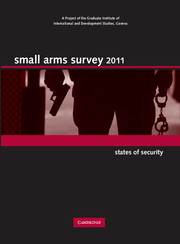Book contents
- Frontmatter
- Foreword
- Contents
- About the Small Arms Survey
- Notes to readers
- Acknowledgements
- Introduction
- Chapter 1 Larger but Less Known: Authorized Light Weapons Transfers
- Chapter 2 Fact or Fiction?: The UN Small Arms Process
- Chapter 3 Procurement and Policy: Police Use of Emerging Weapons Technology
- Chapter 4 A Booming Business: Private Security and Small Arms
- Chapter 5 Protected but Exposed: Multinationals and Private Security
- Chapter 6 Ethos of Exploitation: Insecurity and Predation in Madagascar
- Chapter 7 Reforming the Ranks: Public Security in a Divided Côte d'Ivoire
- Chapter 8 Securing the State: Haiti before and after the Earthquake
- Chapter 9 Balancing Act: Regulation of Civilian Firearm Possession
- Index
Chapter 2 - Fact or Fiction?: The UN Small Arms Process
Published online by Cambridge University Press: 05 March 2012
- Frontmatter
- Foreword
- Contents
- About the Small Arms Survey
- Notes to readers
- Acknowledgements
- Introduction
- Chapter 1 Larger but Less Known: Authorized Light Weapons Transfers
- Chapter 2 Fact or Fiction?: The UN Small Arms Process
- Chapter 3 Procurement and Policy: Police Use of Emerging Weapons Technology
- Chapter 4 A Booming Business: Private Security and Small Arms
- Chapter 5 Protected but Exposed: Multinationals and Private Security
- Chapter 6 Ethos of Exploitation: Insecurity and Predation in Madagascar
- Chapter 7 Reforming the Ranks: Public Security in a Divided Côte d'Ivoire
- Chapter 8 Securing the State: Haiti before and after the Earthquake
- Chapter 9 Balancing Act: Regulation of Civilian Firearm Possession
- Index
Summary
Introduction
In a continuing saga, 2010 saw the UN small arms process struggling with its future. On the positive side, the Fourth Biennial Meeting of States produced a substantive outcome document on the implementation of the UN Small Arms Programme of Action (PoA) (UNGA, 2001), including detailed text on process issues. The year also witnessed a successful start to UN negotiations on an Arms Trade Treaty (ATT).
Yet some of the failures were striking. Exceptionally low rates of reporting and information exchange in 2010 suggest that UN member states were largely indifferent to the International Tracing Instrument (ITI), five years after its adoption by the UN General Assembly (UNGA, 2005). A decade after the finalization of the PoA, UN member states continued to balk at any form of independent assessment of implementation. They may have something to hide; the Small Arms Survey's examination of the national points of contact (NPCs), which states are supposed to establish under the PoA, indicates that just over one-quarter of the UN membership has functioning NPCs in place.
The UN small arms calendar for 2011 features a new type of meeting for the PoA, an Open-ended Meeting of Governmental Experts (MGE). The UN General Assembly's broad (‘omnibus’) resolution on small arms now runs to 31 operative paragraphs.
- Type
- Chapter
- Information
- Small Arms Survey 2011States of Security, pp. 43 - 68Publisher: Cambridge University PressPrint publication year: 2011



